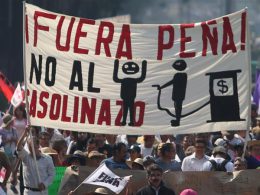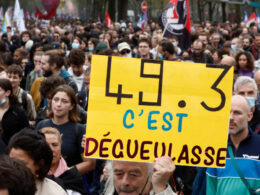The mobilisation of the French working class has now reached a crucial stage. Strikes and mass demonstrations today, according to the CGT trade union confederation, again brought a staggering 3.5 million people onto the streets.
Starting from a fierce opposition to the pensions reform, the movement has taken a much wider, deeper, and more radical character. This fierce movement of the French workers, as well as the youth, has become an opportunity to demonstrate their massive anger against the general state of affairs, and their rejection of the present right-wing Sarkozy government.
It is the accumulated frustration with the deteriorating working conditions, the wages, the rising unemployment, the arrogance of Sarkozy and his super-rich cliques, the growing poverty linked to the billions given to the rich, which is now bursting out on the surface in all corners of the country.
Quoted in the English newspaper, the Observer, Cecile Rimboud, member of the Gauche Revolutionnaire (CWI in France) in Paris, said: “For us, this is a protest not only against the pensions reform, but also against the wider politics of this government – politics that favour those who are already favoured by society”.
The support for the social movement is still standing firm, even tending to rise in the opinion polls. In one poll, published on Monday, even 34% of “right-wing sympathisers” are supporting the movement, with 88% for the left. The impressive figures for the seven days of actions which have already taken place since June show that workers are determined not to give up.
The mood is one of sustained radicalisation, and a lot of workers who are not yet on strike, or who cannot go on strike easily for different reasons, are looking sympathetically to the movement, and could join it in the very near future.
On the other hand, Sarkozy has not decided to give up either. The implications of a retreat for the government are too big. Such a retreat would give a new influx and confidence to the workers, who, feeling their force, could initiate a new, and more massive, wave of struggle that could have further repercussions, including beyond French borders.
Workers will get increasingly hungry, not only for defeating the pensions reform, but to push the struggle further and use the present movement to achieve demands on a wide range of other issues. Sarkozy has therefore decided to inflict a harsh defeat on the French workers’ movement – of a scale similar to what Thatcher inflicted on the miners in Britain in the 1980s – in the hope of opening the gates for a range of harsh neoliberal attacks. The French government’s inflexible stance has become in itself a factor in the radicalising of the masses.
Since last week, the decisive entering of the youth, especially the school-students, into the movement, has given it a new character, and has dashed the hopes of the government that the end of the mobilisations could be approaching. Recently, young people in France took to the streets during the struggle against the CPE, the ‘First Job Contract’, that allows workers under 26 to be sacked without reason or warning during their first 24 months with any employer, in 2006.
One French commentator then said: “French school students are like toothpaste; when they go out into the streets it is impossible to put them back”. This lesson is being learnt once again by the French establishment, which, by multiplying provocations against the youth to avoid them participating in the movement, has only succeeded in convincing more to join.
And the university students, who have mostly stayed in the starting blocks until now, are also expressing growing signs of their will to join the struggle. Significantly, in a recent survey published in Le Monde, a quarter of French young people “want a radical transformation of society through revolutionary change”.
Lack of leadership
One striking feature of the present movement is the lack of a central leadership, providing clear answers and a strategy to organise the struggle. The national leaderships of the big trade union confederations are stuck in a state of confusion, not really knowing how to proceed in order to manage a ‘soft landing’ of the present mobilisations.
Controlling their troops and bringing an end to the radicalisation wave has become their main concern. The newspaper Le Figaro has quoted Maurice Thorez, general secretary of the French Communist Party during the mass strikes of June 1936: “It is necessary to know how to finish a strike”.
That is the dilemma facing the top officials of the trade union movement. From the start they entertained the hopes that Sarkozy would open negotiations and give some concessions and amendments to the reform, which would allow them to buy a temporary social peace.
However, the present period is not one of social peace and sustainable economic growth, where the ruling class can ‘afford’ to give such concessions; it is one of economic crisis, heightened economic competition between capitalist countries, and decisive social wars that the ruling classes, in France as throughout Europe, are leading against the working class’s gains of the past.
Some of the right-wing union leaders are still expecting that the vote in the senate on the pensions reform on Wednesday could represent an ‘alibi’ for a ‘fair’ retreat, arguing that ‘the struggle is over now, we have done all we could do’. However, this does not take into account the fact that workers and young people are not ready to give up the fight so easily. The idea that ‘we need to continue the struggle until victory’ – even if what is meant by ‘victory’ is still quite confused among the broad layers of workers – is widespread.
Bernard Thibault, general secretary of the CGT, the largest trade union confederation in France, declared that the vote in the senate won’t prevent the movement’s continuation afterwards. This reflects that the whole trade union bureaucratic apparatus can be pushed by a powerful movement and that they fear losing control.
To some extent, this is already the case. In a recent poll 54% of people say they want a “general strike like in 1995”. This refers to the mass strike movement which stopped the ‘Juppé Plan’, an extensive program of welfare cutbacks, in 1995. Now, every day, new sectors are announcing actions. The courageous strike actions and blockades by workers from oil refineries and dockers have resulted in a small state of panic for the government and the bosses. These actions have been joined by many others, in the public and the private sectors, such as the truck drivers.
Renewable strike action is being voted for in hundreds of workplaces. All this is done, most of the time, in a spontaneous way by initiatives from below since the union leaders have been in denial of the need for a general strike all the way through. The decisive question now being posed is how this released energy will develop in the next period.
What perspective?
Indisputably, the present situation in France presents some pre-revolutionary elements. The ruling class is increasingly divided, the government extremely unpopular, the middle classes feel their position undermined and are losing their confidence in the present regime, and the working class, at least the most advanced sectors, are showing a tremendous determination to fight, having given birth to a movement which is even surprising the more far-sighted commentators.
On the other hand, the degree of organisation and of experience of the working class has suffered important setbacks in the last decades when neoliberal ideas have been to the fore. This weighs in a negative way on the situation. Political understanding is not on the same level that it was in May 1968, a period during which socialism was seen by broad layers of workers and youth as an alternative to capitalism.
Today in France discussions are flowering on how to organise the struggle, the will to get rid of Sarkozy’s government is very widespread, but the discussions are not generally yet reaching the stage of ‘what’s the political alternative to the present system?’
There are many uncertainties and complications regarding the outcome and aftermath of what is developing in France at the moment. The situation is so volatile and the atmosphere so electric that one small element can make the whole situation blow up.
What is clear is that France is entering a new period, where French youth and workers have made significant steps forward, but are still searching for a clear political expression for their anger against a system that is made only for the rich. The next days will see new developments, new actions, and opportunities to raise the need of changing this society.












